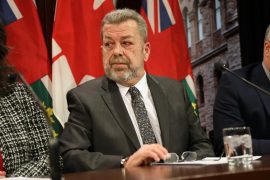Green Party members have picked Toronto lawyer Annamie Paul as their next leader, bringing to a close the year-long race to replace Elizabeth May.
Paul, who is Black and Jewish, was the perceived frontrunner heading into the final vote because she had raised the most money — $206,000 — and racked up a number of endorsements from former Green Party candidates.
Paul, who is the first permanent Black leader of a major federal political party in Canada, assumes the leadership of a party that has been closely tied to May for the better part of the last 14 years.
Before handing the job to Paul, May delivered an impassioned plea to Canadians to do more to address the climate “crisis,” saying the ongoing fight against COVID-19 can’t distract from pressing environmental concerns.
Paul, who was born in Canada to Caribbean immigrants, claimed victory with 12,090 votes against her closest competitor, Dimitri Lascaris, another lawyer and a self-described radical and “eco-socialist,” who had 10,081 votes after eight rounds of voting.
A party official said 23,877 Green voters cast a ballot in this race — a 69 per cent turnout.
Below is an earlier version of this story.
The Green Party of Canada will today announce its next leader — the successor to B.C. MP Elizabeth May, who has been at the helm of the party for nearly 14 years.
The party’s 35,000 members have been casting votes online since last Saturday, and interim leader Jo-Ann Roberts is to reveal the first ballot result shortly after 7 p.m. ET.
With eight candidates vying for the title, the winner is not likely to be known after the first ballot.
A party official said, as of the close of polls, 23,877 Green voters cast a ballot in this race — a 69 per cent turnout.
Annamie Paul, David Merner, Amita Kuttner, Glen Murray, Dimitri Lascaris, Meryam Haddad, Andrew West and Dr. Courtney Howard — easily the most racially and ideologically diverse group of candidates to compete in a federal leadership race — have all put their names forward to run the party that has the fewest number of seats in the House of Commons.
The nearly year-long race hasn’t been without controversy, with allegations of anti-Semitism and racism in the Green Party’s ranks.
At least one contender, Murray, a former Ontario Liberal cabinet minister and mayor of Winnipeg, has also said the party botched the fundraising process, leaving him short thousands of dollars that donors had directed to his campaign.
None of the candidates in the race to replace May have a seat in the Commons, so the winner will lead the party from outside Parliament for now.
One contender, Paul, has said she will run in the upcoming Toronto Centre byelection that was called after the sudden resignation of former finance minister Bill Morneau.
Paul, a Black Jewish human rights lawyer who has worked at the International Criminal Court in the Hague, is the perceived front-runner because she has raised the most money — about $206,000 — during this campaign.
Her nearest rival is Lascaris, a class-action lawyer and environmental activist who has raised $147,000.
Paul and Lascaris also lead the pack in terms of endorsements from former Green candidates.
The party had planned to host the leadership convention in Charlottetown, but those plans were upended by the COVID-19 pandemic.
Instead, the Greens will host a much smaller, physically distanced event at the Ottawa Art Gallery.
The leadership race was prompted by May’s decision to step down as party leader last November.
Since assuming the leadership in August 2006, she has taken the party from the political fringe to the mainstream.
After years of being shut out because of poor polling numbers, May lobbied the broadcast consortium behind the leaders’ debates to give the Greens a podium and the chance to pitch a left-wing environmental agenda to voters.
May’s inclusion in these well-watched debates helped the party post its best electoral result ever in the 2008 federal election — capturing 6.8 per cent of ballots cast.
But it was her 2011 victory in the B.C. riding of Saanich—Gulf Islands that truly bolstered the party’s fortunes, as it gave May a seat in Parliament and a larger platform to advance the Green cause.
Since then, the Greens have won provincial seats in B.C., Ontario and New Brunswick and have formed the official opposition in P.E.I.
May is among Parliament’s most ardent critics of oil and gas pipelines and the country’s natural resources sector. She has also pushed for universal pharmacare, a guaranteed basic income and more decorum in the Commons.
Until her resignation, she was the longest-serving active leader of a party with seats in either the Commons or a provincial legislature.
In announcing her departure, May said she promised her daughter that the 2019 race would be her last, but she has said she will stay on as an MP and the party’s parliamentary leader.
Under May’s leadership in that 2019 campaign, the Greens produced a relatively strong showing of 6.55 per cent of the popular vote but failed to win more than a few seats.
Much of the party’s support was concentrated on Vancouver Island and other parts of British Columbia.
However, New Brunswick MP Jenica Atwin also bested a Liberal incumbent to win her Fredericton seat, the first federal Green victory in the Maritimes.
At the outset of the last two elections, May has predicted that at least a dozen seats would go to the Green Party, but those results never materialized.
May was also dogged by questions about whether she would allow Green MPs to introduce anti-abortion legislation — she said she wouldn’t whip her caucus or forbid MPs from advancing these sort of bills — and faced criticism after the party ran candidates with known anti-abortion views.

Devoted web advocate. Bacon scholar. Internet lover. Passionate twitteraholic. Unable to type with boxing gloves on. Lifelong beer fanatic.




